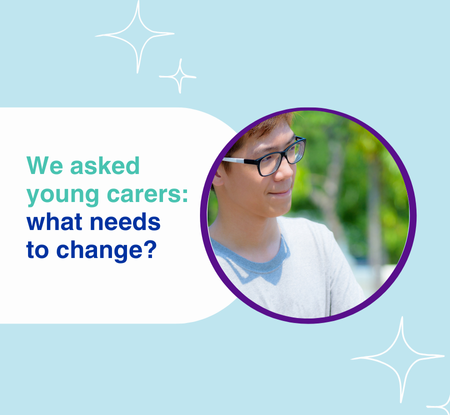Young carers on what needs to change
What do young carers think about balancing caring with school, work, and their social lives? In this blog, we have included words from young carers in North Tyneside about what support they need and what would improve their experience of being a carer.
 What do you want to think young carers need?
What do you want to think young carers need?
“I think more support, more encouragement. They are dealing with the harsh reality of what people might think about the caring role and kind of having to put up with it and not let it affect you that much. You are trying to keep mentally stable and live life to your full potential.”
Do you need more support from school?
“Last year there was a bereavement in the family and there was a lot happening and that took a toll on my mam. It was difficult because I had never been in that situation. Support in school was lacking to say the least. My mam would have more flare ups and be on edge. School didn’t really hear me out. I needed support and I didn’t receive that.”
What could teachers do to help young carers?
“I would say more understanding. Teachers go through a lot. But even just a small appreciation, or saying: I know you have got this caring role, have an extension for that work. It doesn’t have to be having a week off, just the small things make a giant difference.”
What do you want school to know?
“Everyone’s experience is different. In my school there were two of us that were carers. But our roles were completely different. Because the teacher had only spoken to me about my caring role there was a lot of assumption that the other person would need the same. But it wasn’t. So when they needed more support in that situation it wasn’t given because they were only looking at it from my point of view.”
What do you have to think about every day?
“I have so many thoughts in my head about my caring role every day. I think one of the biggest things is: what am I doing today. With my mum’s needs, it changes, some days she needs more help than others.”
What do you find hard?
“You feel useless a lot of the time, especially if they are in agony. You just want to take their pain away and it’s so difficult to try your best to help them even though you can’t. I physically cannot take away this pain.”
WHAT NEEDS TO CHANGE
Below we have outlined some things that would help young carers navigate their responsibilities and their future.
Support in education
The ability to focus on school can be compromised for young carers. According to the Carers Trust, young carers are missing on average 23 days of school every year – that’s more than a month in total.
Schools, colleges, and universities should consider:
- Flexible timetables to accommodate caring duties.
- Extra time to complete assignments.
- A clear policy on identifying and supporting young carers, with teachers trained to recognize the signs and offer help proactively.
Financial support
Young carers often live in households that are financially vulnerable, especially when a parent or family member is unable to work due to illness or disability. As a result, many young carers are also forced to take on part-time jobs to support their families financially, which further limits their time for school, friends, and personal development.
Young carers should have better access to financial support, which could mean:
- Carers’ Allowance being extended to younger carers.
- Bursaries and grants specifically designed to help young carers fund their education and personal needs.
- Support from schools and universities to access free meals, transport subsidies, and educational resources.
Help moving into university/work
The transition from school to university or work can be daunting. Young carers may worry about living away from home, financial concerns, and struggling to balance academic work with care duties. In the workplace, young carers need understanding from employers to manage both work and caring.
To help this:
- Universities and employers should offer greater flexibility and understanding. Universities can implement policies for part-time study options or more distance learning, while workplaces should provide carer-friendly employment practices, such as flexible hours or remote work opportunities.
- Employers could also offer carers’ leave and establish carer networks that provide support for young people balancing work and caregiving.
- Career advisors in schools, colleges, and universities should be trained to offer specific advice to young carers, helping them navigate pathways into higher education or employment while maintaining their caring responsibilities.
Young carers want to be seen, heard, and supported. They need flexibility, recognition, and practical assistance from schools, universities, workplaces, and policymakers. By putting these structures in place, we can give young carers the chance to achieve their potential without being held back by the weight of their responsibilities.
Where can young carers receive local support? Have a look at our young carer project.
